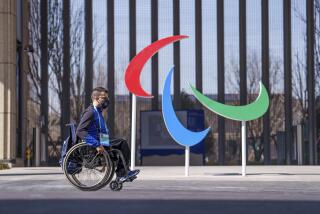Five Republics to Have United Team : Olympics: Russia, Ukraine, Belarus, Kazakhstan and Uzbekistan will compete under Olympic flag at Albertville.
- Share via
MOSCOW — Even though the Soviet Union has split into separate republics, the world’s winningest athletes will compete together in the 1992 Winter Olympic Games, International Olympic Committee President Juan Antonio Samaranch said Saturday.
The Tass news service reported that five of the former Soviet republics that now are part of the Commonwealth of Independent States--Russia, Ukraine, Belarus, Kazakhstan and Uzbekistan--will send 141 athletes and 54 coaches as a united team to the Winter Olympics, which begin in two weeks in Albertville, France.
The Soviet Union, which first competed in the Olympics in 1952, quickly became the consistent powerhouse of both the Winter and Summer Olympics. In 1988, the Soviet Union won more medals than any country in both games--29 in the Winter Olympics and 132 in the Summer Olympics.
But the politics of fielding a team to these Olympics were very tricky, considering that the Soviet Union ceased to exist a month ago.
Showing once again that the etiquette in international sports is even more exacting that the etiquette for international politics, Samaranch and Russian President Boris N. Yeltsin met in the Kremlin on Saturday to work out a delicate protocol for the former Soviet republics’ participation at Albertville.
Members of the united team of former Soviet republics will march under the Olympic flag. If teams or individuals win medals, the five-ring Olympic flag will be raised and the Olympic anthem will be played. When members of the united team win medals in individual competitions, an announcer will specify which republic the athlete calls home.
The Olympic committees of several of the newly independent republics would prefer that their athletes compete under their national flags and hear their national anthems when they win. But this is not possible, Samaranch said, because the International Olympic Committee has not had enough time to formally recognize the national Olympic committees of the members of the Commonwealth of Independent States, which was created out of 11 of the 15 former Soviet republics.
The Olympic committees of Latvia, Lithuania and Estonia, which were part of the Soviet Union until the end of the summer, have been recognized by the International Olympic Committee. So, the athletes of the three Baltic states will compete under their own national flags.
There will be a new protocol in time for the Summer Games in Barcelona, Spain, Samaranch said, because by then the national Olympic committees of the republics will have been recognized.
In Barcelona, when individual athletes representing the united Commonwealth team win an event, flags of their republics will be raised and their national anthems played.
Winning political independence has been faster for the republics than winning independence in athletics. According to Samaranch, athletes from these republics must wait until Jan. 1, 1993, before they can compete in international competitions as representatives of their republics.
The combination of politics and sports is not new for athletes in the former Soviet Union.
Throughout the Cold War, sports, especially Olympic sports, played a definite political role in the relations between the two superpowers. In 1980, the United States and 61 other nations boycotted the Moscow Olympics in protest of the Kremlin’s invasion of Afghanistan, and in 1984 the Soviet Union and its allies boycotted the Los Angeles Olympics.
Samaranch said that after his meeting with Yeltsin, he has no fear that Russian athletes will suffer from the political games of their new leader.
“He is a man who knows sports very well,” Samaranch said. “The meeting with Boris Yeltsin was very easy, for we had one common goal: to enable athletes to compete in the Olympics.”
Yeltsin, who was a volleyball player and coach in earlier years, is now an avid tennis player.
Many have questioned whether the republics of the former Soviet Union can continue to dominate the Olympics. But Samaranch said he is optimistic.
“I think the united team will be number one in medals in Albertville and maybe in Barcelona too,” Samaranch said.
More to Read
Go beyond the scoreboard
Get the latest on L.A.'s teams in the daily Sports Report newsletter.
You may occasionally receive promotional content from the Los Angeles Times.






